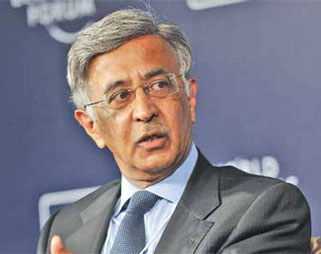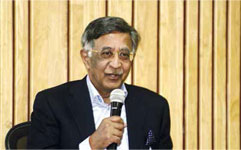“with Digitisation, things will change and become more transparent to everyone’s benefit automatically. I just hope our government under our dynamic PM with his vision of 2020-India at 75-will make it happen”

Of course, Digitisation is a good thing. The question is how do you apply it in a country as massive and diverse as India? Sure, the Swedish are driving the Digitisation wave, by taking it into homes, universities, companies and so on. But please do note we are talking of a population of 1.3 billion as opposed to nine million in Sweden.
It works extremely well as far as financial services are concerned. A prime instance of that would be the demonetisation and cashless payment move that happened on Nov 8, 2016 and all that ensued; study the period up to March end 2017 and you will realise what I mean! Consider how swiftly large sections of the populace have adopted digital financial transactions as opposed to currency and think, just how much easier, it is going to make the world of finance, in the days to come!
The second area where we are talking better services and better value for everyone around would be government. There is one problem though. Governments and systems are built on regulations in this country. And regulations,unfortunately, have translated into fundamental meaning: how do you deny someone their right. But with Digitisation, things will change and become more transparent to everyone’s benefit-automatically. I just hope our government under our dynamic PM with his vision of 2020-India at 75-will make it happen, so that we don’t have to go and stand in line for simple things like water connections, school admissions, paying bills or filing complaints. All of this will go away-but regulations have to be re-thought. For instance, a lot of digital technology works on radar. But how many Indians have access to radar? That’s why rules have to change.
The third area, where it is working extremely well, in what is no less than a silent revolution is logistics. Companies like ours that use a lot of logistics-both inbound and outbound-as we get our raw material from all over the country-we can track everything we are shipping out on our phone. We have a simple tag on our box and you can track it on real time which would take a whole day of mails and calls earlier. So, logistics is a whole new industry. Imagine a pizza being delivered to your living room via a drone; that’s logistics for you. I know Germany and a couple of Scandinavian countries are delivering medicines to remote areas-and it’s a fantastic and humanitarian use of technology.
The next part, already happening in India, is telemedicine. As our broadband connectivity spreads to increasingly envelop rural India, this is one prime example of how you bring inclusiveness into our society. Programs like the Swachh Bharat program are more than just drives to build clean toilets and sweep streets-they are aimed at fundamentally changing how our society lives and thinks. All of these social welfare drives, to my mind, can benefit from Digitisation.
As far as medicine is concerned-I will give you my own example; not that I need Digitisation-there are plenty of hospitals in Pune-but I’ve had a very severe problem in my right leg for the last two months and just couldn’t sort it out. To that end, a doctor from Mumbai came in to see me. He had a little gadget with which he connected on Facetime with a specialist in Canada despite the massive time gap; he had a system by which he could put in my diagnosis. The specialist would read it and tell him just what to do. In about 20 minutes of this treatment, using the collaborative knowledge of two doctors in different parts of the world, my pain was gone! This is just one instance of how Digitisation is going to work in the field of medicine. Sure, you can’t have the best medical experts in every town and city, but you can certainly have them on phone--either writing prescriptions or transporting medicines.
“now we are talking Smart Robotics-a combination of data management, data systems, data analytics and artificial intelligence, which is why robots can do things on their own in the shop floor”

Now let’s come to the Industry, which is where I belong. How does the Digitisation process work here? Three or four things are happening majorly-and they need to be considered for both present and future potential.
First is, of course, The whole IoT concept-or the Internet of Things, which is creating higher levels of automation, and revving up the ability to get people to communicate with machines, machine to machine, and machine to people, thereby eliminating the whole communication gap. This makes things way more efficient and competitive, and allows us to get the best value out of our assets. This increased simplicity is the best thing to have happened.
The second area would be Robotics. Of course, they’ve been around for 25 years now. But now we are talking Smart Robotics- a combination of data management, data systems, data analytics and artificial intelligence, which is why robots can do things on their own in the shop floor. Of course, this is a few years away as far as India is concerned, but it will happen.
The third area would be 3D Manufacturing-which is the process of manufacturing components using 3D printing. And the input for 3D Manufacturing is a digitally generated model. The good thing about this is that as opposed to yesteryears where you needed CAD-CAM and a whole engineering back office, these days, an app on your phone is good enough to achieve your needs. You just take a picture of what you need digitally generated-and in about 15 minutes you will get that image to feed into your printer! So yes, it has become that sophisticated-and is going to get even more so. I don’t know how many people are aware that in Pune, most of your dental implants are created through 3D printers?! Tomorrow, other medical implants will follow.
Most significantly, digital technology is going to create a huge revolution in manufacturing, in allowing you to let your imagination soar. No longer will you be limited by the machines and processes that you have. You can 3D print metals, plastics and even magnets to lock the door, in place of a latch! I think India is blessed with a large number of young people and innovators. We are good at Mathematics-that’s a great foundation for anything to do with digital processes. Yes, we have a lot of catching up to do in various fields as far as Digitisation goes, but just as we made the easy transition from analogue/ telephone to cellular technology -in a manner that made it possible even for an uneducated person to do intelligent things on his phone-we will catch up in the digital world too!

In a world which is increasingly turning to online educational choices; where universities are offering lots of online programs, obliterating geographical boundaries - I think it becomes hugely imperative for premier educational institutions to have digital libraries for every single department-- and not just one. This will allow students to experience the finest in the world of education and broaden their horizons at the click of a button.
The buzzword today is skilled labour.
Given the backdrop of online classrooms, people are wondering as to whether the system of coming to college, sitting in a class and taking down notes will disappear altogether? To that, my answer is simple: the oldest universities in the world have survived three industrial revolutions; this is the fourth one and they are still going strong, thank you! So yes, curriculums, processes and syllabi will evolve and become more elaborate and sophisticated; maybe some of the teaching and instruction will be outsourced to the computer, but no, I do not see academic institutions as we understand them today, vanishing into thin air. The new generation will find a balance.
“digital technology is going to create a huge revolution in manufacturing, in allowing you to let your imagination soar. No longer will you be limited by the machines and processes that you have”
This supposition that Indian businesses are competitive because of cheap labour is completely wrong. Maybe it worked in the past, where regulations facing industry were extremely stringent; interest rates were as high as 21% and you could not import any machinery sans tons of permits and paperwork. In that scenario, we had no option but to use manual labour. But time and history have rendered that model both wrong and obsolete, for the simple reason that it did not take India anywhere. Today’s industrial world is hi-tech, hi-skill and hi-capital. Sure, interest rates have still high, but they are considerably lower than what they used to be. Therefore, this supposition that cheap labour makes a business work is an inaccurate hypothesis.
“In an agrarian economy like India, Digitisation is going to be a boon to agriculture and farmers. Already it is being used to boost productivity, something that will only increase in the days to come. Today, drones are flying over farms to find out if there is soil contamination and disease in the air, and how that can be worked out. Vertical farming is a reality, something no one thought was possible earlier.
It’s a myth that only big industries can profit from Digitisation. I don’t know how many of us are aware that most of the Gods in our home are made by villagers in China using a simple process of 3D printing. With 3D printing it becomes extremely easy to duplicate things in gold, silver and metal. All this is happening not just in China, but also Vietnam and Indonesia and pretty soon India will catch up too, providing new employment opportunities to several entrepreneurs.
When will the government take internet and computer capabilities to villages? I don’t think it has so much to do with the government as it does with larger industries. There has been much talk about how larger companies are controlling and consolidating digital interface to control digital businesses. Since these guys stand to profit the most, they will provide it-not the government.
(Baba Kalyani is Chairman & Managing Director of Bharat Forge. He recently spoke on the sidelines of a Dialogue on The Opportunities And Challenges Companies, Academia And Society Face In a Newly Digitized World, organized by the Consulate General of Sweden at Pune’s Fergusson College)
by Baba Kalyani